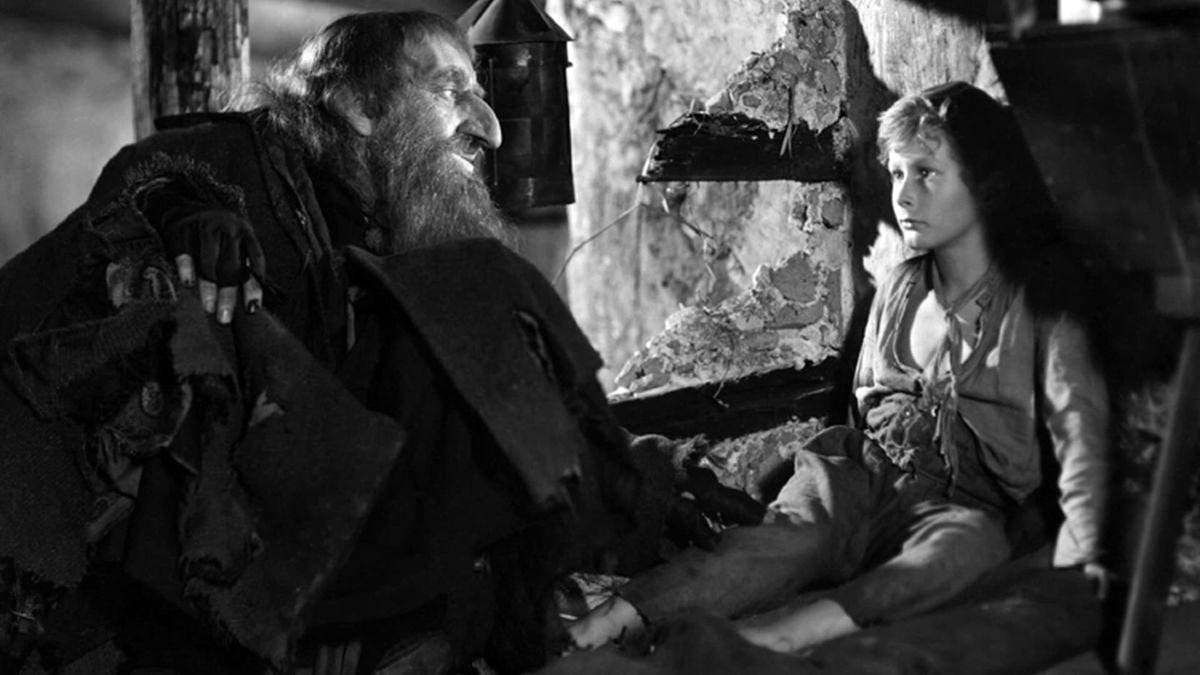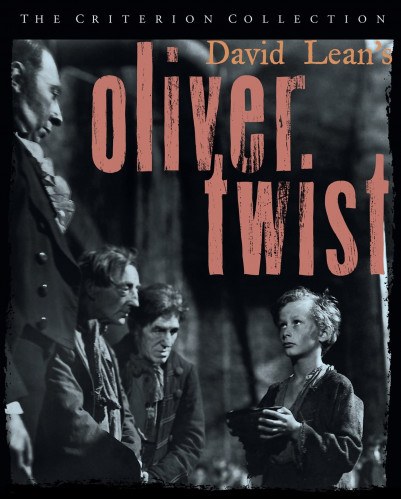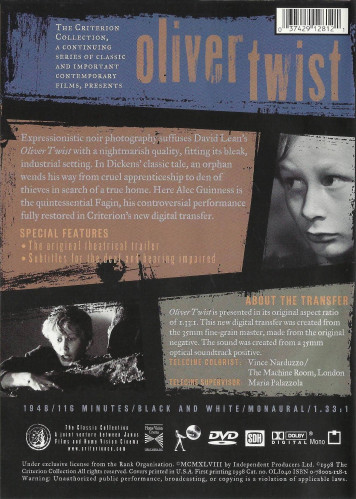OLIVER TWIST [1948 / 1999] [The Criterion Collection] [DVD] [USA Release] One of the Greatest Stories of all time, and grows to new greatness on the silver screen!
Expressionistic noir photography suffuses Sir David Lean’s ‘OLIVER TWIST’ with a nightmarish quality, fitting its bleak, industrial setting. In Charles Dickens’ classic tale, an orphan wends his way from cruel apprenticeship to den of thieves in search of a true home. Here Sir Alec Guinness is the quintessential Fagin, his controversial performance fully restored in The Criterion Collection’s digital transfer.
The Criterion Collection is dedicated to gathering the greatest films from around the world and publishing them in editions of the highest technical quality. With supplemental features that enhance the appreciation of the art of film.
FILM FACT No.1: Awards and Nominations: 1948 Faro Island Film Festival: Nomination: Golden Train Award for Best Film for Sir David Lean. 1948 Venice Film Festival: Win: International Award for Best Production Design for John Bryan. Nomination: Grand International Award for Sir David Lean. 1949 BAFTA Awards: Nomination: Best British Film.
FILM FACT No.2: Although critically acclaimed, Sir Alec Guinness's portrayal of Fagin and his make-up was considered anti-Semitic by some as it was felt to perpetuate Jewish racial stereotypes. Sir Alec Guinness wore heavy make-up, including a large prosthetic nose, to make him look like the character as he appeared in George Cruikshank's illustrations in the first edition of the novel. At the start of production, the Production Code Administration had advised Sir David Lean to “bear in mind the advisability of omitting from the portrayal of Fagin any elements or inference that would be offensive to any specific racial group or religion.” Sir David Lean commissioned the make-up artist Stuart Freeborn to create Fagin's features; and Stuart Freeborn had suggested to David Lean that Fagin's exaggerated profile should be toned down for fear of causing offence, but Lean rejected this idea. In a screen test featuring Sir Alec Guinness in toned-down make-up, Fagin was said to resemble Jesus Christ. On this basis, Sir David Lean decided to continue filming with a faithful reproduction of George Cruikshank's Fagin, pointing out that Fagin was not explicitly identified as Jewish in the screenplay. When released in 1948, the film was criticized by American columnist Albert Deutsch, who had seen the film in London. Deutsch wrote that even Charles Dickens “could not make Fagin half so horrible, and warned that the film would fan the flames of anti-Semitism.” The New York Board of Rabbis appealed to Eric Johnston, head of the Production Code Administration, to keep the film out of the U.S. Other Jewish groups also objected, and The Rank Organization announced in September 1948, that the U.S.A. release was “indefinitely postponed.” As a result of such protests, the film was not released in the United States until 1951, with 12 minutes of footage removed. It received great acclaim from critics, but, unlike Lean's Great Expectations, another Dickens adaptation, no Oscar® nominations. The film was banned in Israel for anti-Semitism. It was banned in Egypt for portraying Fagin too sympathetically. The March 1949 release of the film in Germany was met with protests outside the Kurbel Cinema by Jewish objectors. The Mayor of Berlin, Ernst Reuter, was a signatory to their petition which called for the withdrawal of the film. The depiction of Fagin was considered especially problematic in the recent aftermath of The Holocaust. Beginning in the 1970’s, the full-length version of Sir David Lean's film began to be shown in the United States. It is that version which is now available on DVD. In 1999, the British Film Institute placed ‘OLIVER TWIST’ at 46th in its list of the top 100 British films. In 2005 it was named in the BFI list of the 50 films you should see by the age of 14.
Cast: Robert Newton, Sir Alec Guinness, Kay Walsh, Francis L. Sullivan, Henry Stephenson, Mary Clare, Anthony Newley, Josephine Stuart, Ralph Truman, Kathleen Harrison, Gibb McLaughlin, Amy Veness, Frederick Lloyd, John Howard Davies, Henry Edwards, Ivor Barnard, Maurice Denham, Michael Dear, Michael Ripper, Peter Bull, Deidre Doyle, Diana Dors, Kenneth Downey, W.G. Fay, Edie Martin, Fay Middleton, Graveley Edwards, John Potter, Maurice Jones, Hattie Jacques, Betty Paul, Barbara Bennett (uncredited), Johnny Briggs (uncredited), Robin Burns (uncredited), Albert Chevalier (uncredited), Erik Chitty (uncredited), Arthur Mullard (uncredited), Nosher Powell (uncredited), Arthur Sandifer (uncredited), Eustace Shipman (uncredited), Paul Stockman (uncredited), Donald Wescott (uncredited) and Dennis Wyndham (uncredited)
Director: Sir David Lean
Producer: Ronald Neame
Screenplay: Charles Dickens (novel), Sir David Lean (screenplay), Stanley Haynes (screenplay), Eric Ambler (contributor to screenplay) (uncredited) and Kay Walsh (contributor to screenplay) (uncredited)
Composer: Sir Arnold Bax (Director of Music as the Master of the King's Musick)
Costume Design: Margaret Furse (costumes)
Cinematography: Guy Mervin Charles Green, O.B.E. B.S.C. (Director of Photography)
Image Resolution: 1080i (Black-and-White)
Aspect Ratio: 1.37:1
Audio: English: 1.0 Dolby Digital Mono Audio
Subtitles: English
Running Time: 115 minutes
Region: NTSC
Number of discs: 1
Studio: The Rank Organisation / The Criterion Collection
Andrew’s DVD Review: ‘OLIVER TWIST’ [1948] Sir David Lean followed his prodigious adaptation of Charles Dickens’ ‘Great Expectations’ with this brilliant crystallization of Charles Dickens’ ‘OLIVER TWIST,’ or the Parish Boy’s Progress. It deploys the cinema’s special powers of dash and immediacy to convey all the venturesomeness (the trait of being adventurous) and vulnerability of youth. It was Sir David Lean who suggested to Sir Arnold Bax, the composer of the turbulent, eloquent score, that the film ‘OLIVER TWIST theme be rendered on solo piano, to represent “the lonely boy in a world of bullying adults.” Yet from the moment Oliver Twist [John Howard Davies] utters the words that have made him famous — “Please sir, I want some more.” — Sir David Lean also celebrates his steel. With the surgical clarity of his born-moviemaker’s vision, Sir David Lean recognized that Charles Dickens used the novel “Oliver Twist” to describe the values adults should treasure in children and the power children have to protect themselves.
In the opening seconds, finds Oliver Twist’s exhausted mother [Josephine Stuart] pushes on against a storm so she can give birth to Oliver Twist in shelter, and Sir David Lean elevates melodrama to poetry — and never lets it drop for the 116-minute running time. Sir David Lean also invests audio-visual details with metaphoric as well as graphic power, until two creaking, thorny briers embody the bending yet unbroken will of the spasm-racked girl. The first full lightning-lit flash of the workhouse is as eerily sharp as a lithographic plate. The wail of the baby beside the mother’s bed caps the introduction like the drum-clap in an overture.
Charles Dickens believed childhood should be a time of freedom, trust, and tenderness. Charles Dickens also knew that when those qualities are threatened, kids react with righteous fury. Sir David Lean builds the film on these and other dizzying polarities, flinging viewers between despair and hope. It’s black-comic terror to see Oliver Twist and his fellow orphans spy on their warders stuffing their faces; later, it’s a thrill and a delight to see Oliver Twist knocking down that sour undertaker’s underling, Noah Claypole [Michael Dear], who insults his dead mother.
These juxtapositions fuel even richer ones when Oliver Twist escapes to London, where the Artful Dodger [Anthony Newley] delivers him to the notorious fence, Fagin. After the desperation and pallor of the workhouse lads, Artful Dodger and the rest of Fagin’s gang are refreshingly blithe and hearty. Our affection for them swiftly dissipates when they let Oliver Twist takes the fall for a bungled pickpocketing. The film becomes a fight between the forces of darkness, led by Fagin and his murderous crony, Bill Sykes [Robert Newton], and the forces of light, led by Oliver Twist’s benefactor, Mr. Brownlow [Henry Stephenson], and Bill Sykes’ repentant girl, Nancy. No movie has been better at capturing Charles Dickens’ blend of sensitivity and violence.
Sir David Lean primes the tear ducts and adrenal glands simultaneously; you feel his characters’ poverty and want not just in your hearts, but in your muscles, tendons, and joints. But Sir David Lean’s mastery of kinaesthetic moviemaking is renowned. What’s less often acknowledged is his genius for casting. Eight-year-old John Howard Davies as he imparts a remarkable lyric presence to Oliver Twist and his curly blond hair and deep, wide eyes give him the look of a slim cherub — with a streak of insubordination.
Oliver Twist’s fluid emotionality provides counterpoint to the film’s dazzling other characters in the film ‘OLIVER TWIST.’ Young Anthony Newley approaches perfection as the Artful Dodger; Robert Newton oozes paranoia and sadism as Bill Sykes; Kay Walsh brings off Nancy’s passionate lamentations with fiery eyes and a pugnacious chin. And Sir Alec Guinness is audaciously funny and sinister as Fagin and his makeup, including an enormous proboscis straight out of George Cruikshank’s illustrations, raised questions of anti-Semitism and enveloped the film in controversy.
Sir David Lean was a master of the cinematic art, and every lighting trick, camera angle, set detail, costume, and sound effect on display bolsters the sharp storytelling in this film. The stunning black-and-white photography in Oliver Twist helps to underscore the dreary unseen worlds of oppression: in the workhouse, at the factory that abuses child workers, on the streets where orphaned urchins are slaves to Fagin’s unsavoury gangs.
The dark and the light tell the story here, too. Bad things happen in the darkness – both metaphorical and actual -- and good things happen in the light – of day and of the enlightened mind. It's at night that a man murders his girlfriend. But the murder is never actually shown. The low-angle view of a raised murder weapon predicts the terrible violence about to unfold.
John Howard Davies is still perhaps the most memorable and affective Oliver Twist yet seen on screen; the delicacy of his speech, and his muted, often awkward movements perfectly capture the sense of confinement that define the character. Robert Newton's Bill Sikes is another highlight; the most relaxed performance Lean ever let slip through his directorial net.
The depiction of London is also a key factor in this film's success. The stark lighting is somewhat softened by the sooty feel of London, and this makes for a perilous atmosphere whenever the story takes us onto the streets. It is the first of Sir David Lean's films to attempt an epic scale with real confidence and assurance. When set against some of the overblown visualise imagery of his later work, ‘OLIVER TWIST’ may be the very best of Sir David Lean's “big” films.
What is also exceptional are the performances with John Howard Davies, Anthony Newley, Robert Newton and Kay Walsh amongst many others delivering first rate performances. But unsurprisingly they are all over shadowed by Sir Alec Guinness whose characterisation of Fagin is something quite extraordinary, making him amusing yet sinister in a blink of an eye. Part of what makes the film so good is the work of the make-up department to really build the character of Fagin with his beak of a nose but Sir Alec Guinness is totally astonishing.
But Sir David Lean's direction and Guy Mervin Charles Green's camera-work has drawn me back to this DVD every couple of years, and at least I always know there is a very happy ending for Oliver Twist the one nice child we sympathise a great deal in the film ‘OLIVER TWIST.’
The Criterion Collection DVD of ‘OLIVER TWIST,’ with scene after scene is just jaw-dropping. I have never seen so many incredible shots with wonderful contrasts of light and dark. Much of this is filmed in dark rooms or night-time in the cobblestone streets of Victorian London. Those scenes, combined with many facial close-ups, great buildings, and interesting camera angles, all make this an incredible viewing experience. What this all boils down to is that the film ‘OLIVER TWIST’ is amazing, especially with the Sir David Lean's direction and the acting especially from Sir Alec Guinness was something very special. This version of ‘OLIVER TWIST’ is well worth a watch to see how great black-and-white movies can be and especially with Sir David Lean's masterful craftsmanship making it something totally extraordinary and totally unique. But to sum up, if you do not have floods of tears at the end of the film, then that about sums up that the vat that you have no compassion in your life.
OLIVER TWIST MUSIC TRACK LIST
MY HAT, IT HAS THREE CORNERS (uncredited) (Traditional) [In the score during a conversation between Mr. Bumble and Monks]
HE DON’T KNOW WHEN TO STOP (uncredited) (Music by Frederic Lewis) (Lyrics by Ronald Hill)
CAMBERWELL ROAD ON A SUNDAY NIGHT (uncredited) (Lyrics: Traditional) (Music by Guy Warrack)
TIPPITIWITCHET (uncredited) (Lyrics: Traditional) (Music by Guy Warrack) [Sung by Betty Paul as '”Lucy Willow”]
* * * * *
DVD Image Quality – The Rank Organisation and The Criterion Collection presents us the film ‘OLIVER TWIST’ with 1080i Black-and-White and shown in the 1.37:1 aspect ratio. With a transfer made from the original 35mm fine-grain master, and made from the original negative and is apparently still in a varied image condition throughout the length of the film ‘OLIVER TWIST.’ Image quality can vary and when excellent, they can be crisp and sharp as could be, and grey values “pop” with a dazzlingly luminous presence seldom equalled in any format. A few inconspicuous nicks and scratches appear now and again, which is to be expected with a film of this age. But with these blemishes are very fleeting and do not distract at all from the viewing experience of an otherwise superb transfer.
DVD Audio Quality – The Rank Organisation and The Criterion Collection brings us the film ‘OLIVER TWIST’ with a 1.0 Dolby Digital Mono Audio experience and was created from the original 35mm optical soundtrack positive, and the dialogue is still very easy to understand and the composed music has some decent range. There is some background noise, pops, and scratches, but it doesn’t overly harm the audio presentation of the film.
* * * * *
DVD Special Features and Extras:
Theatrical Trailer [1948] [489i] [1.37:1] [2:14] This is the original Theatrical Trailer for the film ‘OLIVER TWIST.’
BONUS: New cover by Gordon Reynolds.
PLUS: A wonderful 4 page insert featuring an in-depth essay by Michael Sragow who reviews new movies for SF Weekly and old ones for the publication the New Yorker.
Finally, with the film ‘OLIVER TWIST,’ Sir David Lean was a master of the cinematic art, and every lighting trick, camera angle, set detail, costume, and sound effect on display bolsters the sharp storytelling in this film. The stunning black-and-white photography in Oliver Twist helps to underscore the dreary unseen worlds of oppression: in the workhouse, at the factory that abuses child workers, on the streets where orphaned urchins are slaves to unsavoury gangs. The dark and the light tell the story here, too. Bad things happen in the darkness -- both metaphorical and actual – and good things happen in the light of day and of the enlightened mind. It's at night that a man murders his girlfriend. But the murder is never actually shown. The low-angle view of a raised murder weapon predicts the terrible violence about to unfold. With Sir Alec Guinness, who had teamed up with Lean for an earlier Charles Dickens adaptation, the 1946 Great Expectations film, but here Sir Alec Guinness is done up in a dramatic makeup job that makes the great actor looks totally transformed, especially with his overdone nose, beard, and wig would never work in a colour film, and is barely recognizable in this black-and-white film. The film doesn't identify Fagin specifically as Jewish, but the exaggerated hooked nose that Sir David Lean chose for Sir Alec Guinness to wear caused controversy and accusations of anti-Semitism, unsurprising given its release only three years after the Holocaust ended. Anti-Defamation League protests prevented the film from being released in the United States until 1951. The edited version then cut most of Fagin's profile shots. But of course for modern audiences, those scenes have happily been restored. Highly Recommended!
Andrew C. Miller – Your Ultimate No.1 Film Aficionado
Le Cinema Paradiso
United Kingdom



